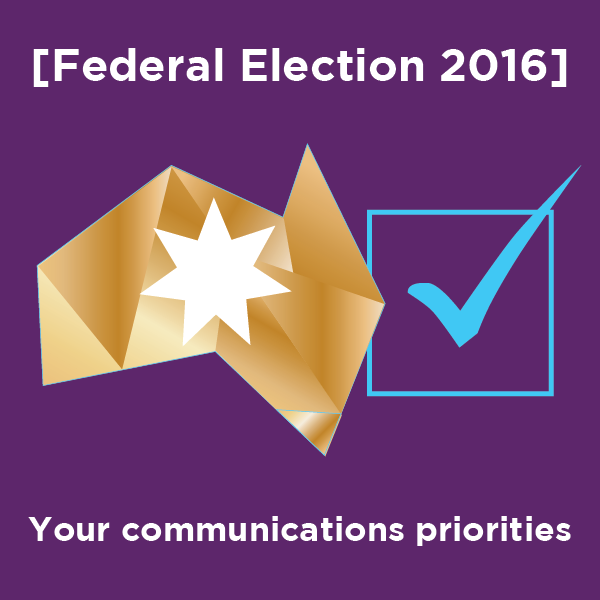Hot Issues
Welcome to the latest current affairs that impact communications consumers.
Sign up for ACCAN's weekly newsletter to have these news items sent to your email address each week.
[ List view | Detailed view ]
- Details
ACCAN has written to the major political parties (the Liberal Party, the Australian Labor Party, the Nationals and Australian Greens) to raise awareness of the need for politicians and government agencies to ensure that all of their online video content is accurately captioned. See below for a copy of this letter.
YouTube has a function that auto-captions videos uploaded to the site, but these captions are often inaccurate. Videos that are uploaded to Facebook often have no captions.
One in 6 Australians suffer from hearing loss; that’s 1 in 6 consumers who are not able to access online videos due to unreadable captions or a lack of captions. Access to information is especially important during the lead up to the 2016 Election. If videos are not properly captioned then many consumers will miss out on important information.
Read more: Online videos need to be properly captioned
Write comment (0 Comments)- Details
 Amending the Broadcasting Services Act to introduce audio description on free-to-air TV is one of ACCAN’s 2016 communications consumer priorities. Introducing audio description on Australian TV would provide greater access for consumers who are blind or vision impaired. Currently there is no audio description on Australian free-to-air TV.
Amending the Broadcasting Services Act to introduce audio description on free-to-air TV is one of ACCAN’s 2016 communications consumer priorities. Introducing audio description on Australian TV would provide greater access for consumers who are blind or vision impaired. Currently there is no audio description on Australian free-to-air TV.
Audio description is additional verbal narration that describes visual elements shown on screen during pauses in dialogue. It can describe elements such as scenes, costumes and actions.
Read more: Update on audio description
Write comment (0 Comments)- Details
 This week, the Coalition and Labor both announced that if elected they would commit extra funding to the Mobile Black Spot Programme. The announcement that an extra $60 million in funding will be allocated to the Programme is welcomed by ACCAN.
This week, the Coalition and Labor both announced that if elected they would commit extra funding to the Mobile Black Spot Programme. The announcement that an extra $60 million in funding will be allocated to the Programme is welcomed by ACCAN.
Mobile coverage is a key issue for consumers, particularly those who live in regional, rural, and remote areas. This is clear from the more than 10,600 mobile black spots identified in the Programme so far. Improving mobile coverage is one of ACCAN's ongoing key work priorities.
Read more: Extra funding for Mobile Black Spot Programme
Write comment (0 Comments)- Details
 To find out more about the communications policies of the major political parties we have posed questions to them on these communications consumer priorities and other important issues. When the answers to our questions are available we will post them on this webpage. More information on communications consumer priorities is available on our Election webpage.
To find out more about the communications policies of the major political parties we have posed questions to them on these communications consumer priorities and other important issues. When the answers to our questions are available we will post them on this webpage. More information on communications consumer priorities is available on our Election webpage.
Read more: Federal Election questions to major parties
Write comment (0 Comments)- Details
 Last week, Optus announced that it had improved the experience for their small business consumers by offering more specialist team members and having a network of small business consumers.
Last week, Optus announced that it had improved the experience for their small business consumers by offering more specialist team members and having a network of small business consumers.
ACCAN welcomes this announcement. These initiatives are a positive step in the right direction.
Read more: More specialist small business telco services needed
Write comment (0 Comments)- Details
 Telecommunications outages happen from time to time. On November 8 2023, Optus experienced a critical nationwide outage on mobile and NBN broadband networks that lasted at least 8 hours and, for some customers, up to 12 hours. As of November 9 2023, Optus is offering affected consumers on eligible plans 200GB of extra data, and free, unlimited data for pre-paid customers on weekends for the rest of the year. For the latest information, see the Optus Outage Response page.
Telecommunications outages happen from time to time. On November 8 2023, Optus experienced a critical nationwide outage on mobile and NBN broadband networks that lasted at least 8 hours and, for some customers, up to 12 hours. As of November 9 2023, Optus is offering affected consumers on eligible plans 200GB of extra data, and free, unlimited data for pre-paid customers on weekends for the rest of the year. For the latest information, see the Optus Outage Response page.
After an outage on its mobile and fixed networks in 2016, Telstra offered its mobile customers free data days as compensation. For the NBN/ADSL outage, Telstra offered a $25 credit to consumers and a $50 credit to businesses who were offline for an extended period of time. This was applied automatically to customer accounts.
Depending on your circumstances, the compensation offered by your telco may not be adequate. If you or your business was affected and suffered losses due to an outage, you may be entitled to seek additional compensation.
Read more: Compensation for telecommunications outages
Write comment (26 Comments)- Details
 You may have noticed that we’ve launched our brand new website. We’ve been working on the new website for quite some time and we’re very excited to finally have it up and running.
You may have noticed that we’ve launched our brand new website. We’ve been working on the new website for quite some time and we’re very excited to finally have it up and running.
The new website is more user-friendly, mobile-friendly and of course, it is accessible to consumers who use assistive technologies like screen readers.
With our new website, we’re well placed to provide consumers with the latest news, information and consumer resources.
The website is now divided into two main areas: Helpful Consumer Information and ACCAN’s Work.
Read more: We’ve launched our new website
Write comment (0 Comments)- Details
Have you received a text message like the one below informing you that you’ve subscribed to a subscription service and will be charged a fee for that service?
These types of messages don’t come from your telco and may result in charges being added to your phone bill. These charges are for third party services which means your telco is allowing another provider to sell content to you which you pay for on your phone bill. What you are buying can be phone apps, pay per view videos, games and other content. They can be one-off charges or ongoing subscriptions.
Read more: What to do if you get third party charges on your phone bill
Write comment (207 Comments)- Details
 How often do you use the internet each week? Statistics from the Australian Bureau of Statistics released in February 2016 showed that the mean number of hours spent per week on the internet for both males and females is 10 hours.
How often do you use the internet each week? Statistics from the Australian Bureau of Statistics released in February 2016 showed that the mean number of hours spent per week on the internet for both males and females is 10 hours.
Ten hours per week doesn’t seem like much time, but when you think about all of the activities we now do online – accessing education, job opportunities, government services and more – our reliance on the internet becomes very clear.
While some of us may take broadband for granted, there is a growing group of consumers from all over the country who are struggling with poor internet services or even no services at all.
Read more: Facebook group helping rural consumers with internet issues
Write comment (0 Comments)- Details
 How do you pay your phone and internet bills? Direct debit from a bank account or credit card? Over the phone or online? How about by BPAY or in person at your provider's store or Australia Post?
How do you pay your phone and internet bills? Direct debit from a bank account or credit card? Over the phone or online? How about by BPAY or in person at your provider's store or Australia Post?
The amount of billing methods available is overwhelming. Each provider has a different range of options, but there are some common ones like those mentioned above.
When choosing how to pay your bill, you should be aware that some methods attract fees. While these are only usually a few dollars or a small percentage of the total amount, over the life of a contract they can add up to a significant amount that you could be saving.
Read more: How do you pay your bill?
Write comment (0 Comments)- Details
 We know that electronic devices, such as microwaves, baby monitors and lamps, can interfere with Wi-Fi, but did you know that your Christmas lights could be causing interference as well?
We know that electronic devices, such as microwaves, baby monitors and lamps, can interfere with Wi-Fi, but did you know that your Christmas lights could be causing interference as well?
With families having extra downtime over the holidays or if you have family visiting you'll need a reliable internet connection to ensure everyone can get connected.
Our friends at the UK telecoms regulator, Ofcom, have published some troubleshooting tips that may be helpful if you're experiencing interference from electronics or your Christmas lights over the festive season.
If these tips don't help solve your Wi-Fi issues we recommend that you contact your provider to discuss the problem with them and get a resolution.
Read more: Are Christmas lights affecting your Wi-Fi?
Write comment (0 Comments)- Details
 No doubt many of us are looking forward to getting a new smartphone for Christmas. But before you rush out to purchase the latest device for a loved one or yourself, there are a few things you should consider.
No doubt many of us are looking forward to getting a new smartphone for Christmas. But before you rush out to purchase the latest device for a loved one or yourself, there are a few things you should consider.
While price is likely to be a key decider, there are other factors to look at. Here are our top tips to keep in mind before purchasing a new smartphone or signing up to a new phone contract during the festive season.
Mobile coverage
The P3 CommsDay Mobile Benchmark 2015 tested the three Australian mobile networks (Telstra, Optus and Vodafone), giving a snapshot of the mobile coverage in larger cities, smaller towns and on highways around Australia. The Benchmark is an independent test that measures the quality of phone calls, and 4G and 3G data downloads.
Read more: Our top tips for buying a smartphone this Christmas
Write comment (0 Comments)
